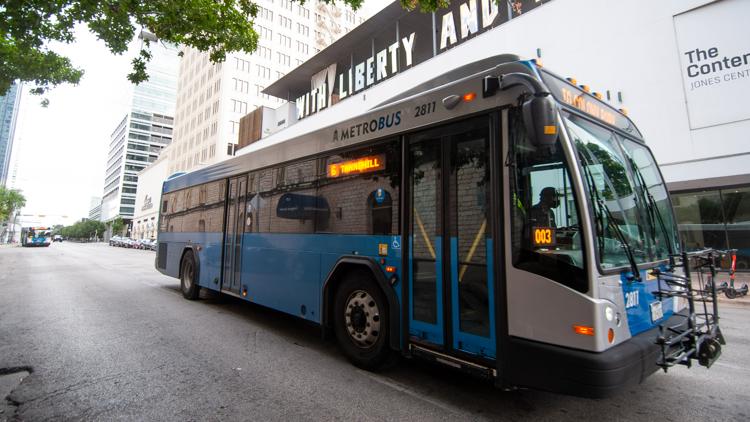
LAGO VISTA, Texas — Smaller cities across Texas are working with state lawmakers to try and change a state law that they say traps cities in what they believe to be unfavorable transit agreements, such as Lago Vista's partnership with Capital Metro. If residents vote to leave an agreement, the city would be on the hook for millions in exit fees, something many smaller towns don't have the resources to pony up. State law also restricts cities from putting the issue of leaving a transit authority on the ballot more than once every five years, but cities like Lago Vista are working with state lawmakers to change that.
Even if residents voted to exit the agreement, Lago Vista City Council Member Shane Saum said they can’t break free without certain financial ruin. If the city wanted to leave the agreement, the exit fee would be based on the entire CapMetro service area, including the city of Austin. “It's not calculated by what their assets in the community are.

It is what percentage of the total service area is your population,” Saum said. “You multiply it by their entire net obligation, financial obligation, which includes the city of Austin and everywhere, and that has grown to a crazy number.” In 2017, the estimated exit fee cost was around $900,000.
By 2022, it jumped to $6 million. Today, it would cost even more. “We have an annual budget above $30 million,” Saum said.
“We don't have $6 million to pay for it.” House Bill 3643 , authored by State Rep. Ellen Troxclair (R-Lakeway), would tie the exit fee to the fair market value of the transit authority's property in the city.
It would only apply to smaller towns comprising 2% or less of the transit system's total population. “It would make it a more fair equation,” Saum said. “If your voters were to tell you to get out of that agreement, it would tie it to the net financial obligation of assets that the transit authority would have in your community and leave there.
Whatever CapMetro had here and we got out, we would gladly pay and make them whole again.” The bill would also allow cities to vote on whether to leave a transit authority every two years instead of five. Lago Vista contributes a 1% sales tax to CapMetro, which amounted to $1.
17 Million in 2024. CapMetro has the 214 bus route and pickup service in town, which operates like Uber. The pickup service had an average of 2,059 customers per month in 2024, and the 214 route had an average number of 1,076 customers per month in 2024.
However, it does not cover the entirety of the city, which is why some community members want to look for other options. “We are not advocating not to have public transportation for our citizens,” Saum said. “We just believe for the service we are getting, CapMetro doesn't even cover the entirety of Lago Vista.
You can't even go from one side of our town to another. We want to get a better deal.” “If we could get out, we'd probably return right back to them and try to broker a better deal that fits the services that we need in our town, but we have to get through this state law to do it,” Saum continued.
Getting the legislation passed is an uphill battle against the city of Austin and CapMetro lobbyists. “That's a lot for us to fight against just to get a fair equation on how to listen to what our voters want,” Saum said. The city council passed a resolution supporting Senate Bill 19 , which bans taxpayer-funded lobbying.
The Senate passed the bill 20-11 earlier this month. “It increases the voices from especially rural Texas because they're not able to compete right now with all of those Congress Avenue lobbyists,” State Sen. Mayes Middleton (R-Galveston), who authored the bill, said.
“Their voice will be louder, as will the voice of our constituents at home because right now, those lobbyists are being paid to drown out the voice of our constituents who are home working and can't be here every day.” The bill is priority legislation for Lt. Gov.
Dan Patrick, who presides over the Senate. Senate Bill 19 would still allow government employees to advocate for legislation on behalf of their employer. During floor debate, lawmakers added an amendment to allow nonprofit associations representing local governments to keep employing lobbyists, even if they are funded by public money.
But several lawmakers said they worried that the change created a loophole to get around the bill. “Rights belong to the people, not the government,” Middleton said. “Taxpayer-funded lobbyists fundamentally disrupt how our constitutional republic is supposed to work by using the people's tax dollars against them.
” This all comes as Lago Vista's growing population is straining the city's water infrastructure . City leaders are concerned about the burden on taxpayers to expand wastewater and drinking water systems. In December, city leaders even went to the White House to ask for federal help.
In the last 10 years, Lago Vista's population has grown from around 6,000 to around 14,000. According to projections, it could grow to 22,000 in the next 10 years, reach 51,000 by 2040 and eventually top out at around 86,000. “It's not just a bill about transportation.
This is touching on all the topics the legislature is discussing,” Saum said. “This impacts property taxes. This is about our water funding and our road funding.
If we have this additional money and a better service, we could be paying for a better water infrastructure and ensuring that we're not raising property taxes on our citizens.” Like many small towns across the state, older infrastructure is being taxed, and the rapid growth happening in the Austin area is already straining the system. The system is already at 75% capacity.
The city is currently in the process of expanding its wastewater plant, with the goal of increasing capacity from one million gallons of water daily to one and a half million. Lago Vista also wants to get to eight million gallons of drinking water daily. The city plans to shift the water treatment burden to the newer plant as part of the projects, after which the old one will become a redundancy.
The total cost is $86 million, well above the city's annual budget of $30 million. “These projects are very expensive. $5 million would pay for this huge effluent dispersal project that we're looking at and pay for us to go to Type 1 effluent that would pay for us to have another pump on the pump house,” Saum said.
“These are major projects that I'm now begging for through funding applications to the state and feds, which are already here in our town.” The city has been applying for federal funds with the help of U.S.
Rep. Michael McCaul’s office. Senate Bill 19 is currently sitting in the Texas House of Representatives in the House State Affairs Committee.
Its counterpart in the House, HB 1189 , also by Rep. Troxclair, is also sitting in that committee, while House Bill 3643 is currently in the House Transportation Committee. A hearing has not yet been scheduled for either of those bills.
.















